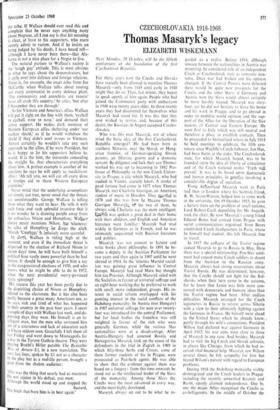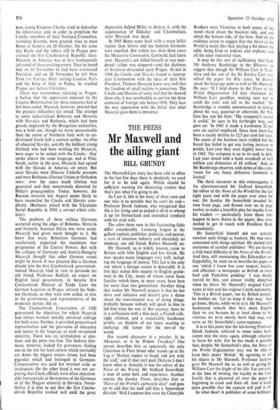Thomas Masaryk's legacy
CZECHOSLOVAKIA 1918-1968 ELIZABETH WISKEMANN
Next Monday, 28 October, be the fiftieth anniversary of the foundation of the first Czechoslovak Republic.
For thirty years now the Czechs and Slovaks have scarcely been allowed to mention Thomas Masaryk—only from 1945 until early in 1948 might they do so. Then, last winter, they began to speak openly of him again. People who had joined the Communist party with enthusiasm in 1948 were twenty years older. In those twenty years they had discovered for themselves what Masaryk had stood for. It was this that they now wished to revive, and, because of this desire, the Russians in August occupied Czecho- slovakia.
Who was this man Masaryk, out of whose mind the basic idea of the first Czechoslovak Republic emerged? He had been born in southern Moravia, near the Slovak or Hung- arian frontier, of German-speaking Slovak parents, an illiterate groom and a domestic servant. By diligence and luck their son Thomas worked his way up to becoming in 1882 Pro- fessor of Philosophy in the new Czech Univer- sity in Prague, a city which Masaryk, who had studied in Vienna, scarcely knew. A stroke of good fortune had come in 1877 when Thomas Masaryk met Charlotte Garrigue, an American, student of music in Dresden. They mai-tied in 1878 and this was how Ile became Thomas Garrigue Masaryk; of the two of them, he always said; Charlotte was the more intelligent. EPOth was spoken a good deal in their home with their children, and English and American literature were familiar. Masaryk had read widely in German as in French, and he was intimately acquainted with Russian literature and politics.
Masaryk was not content to lecture and write books about philosophy. In 1891 he be- came a deputy in the Austrian Parliament for two years and then again in 1907 until he went abroad in 1914. In the 'nineties Marxist social- ism was gaining great influence in Central Europe. Masaryk had read Marx but thought him too Prussian. Although Masaryk sided with the Socialists in favour of universal suffrage and an eight-hour working day he preferred to work with small, more independent, groups. His in- terest in social reform overlapped with his growing interest in the racial conflicts of the Habsburg monarchy. In Austria (not Hungary) in 1907 universal suffrage for men over twenty- four was introduced for the central Parliament, but for local bodies the franchise was still weighted in favour of the rich who were generally German, while the various Slav nationalities were at a disadvantage. After Austria-Hungary had annexed Bosnia and Hercegovina Masaryk took up the cause of the defendants in the trial in Zagreb in 1909 in which fifty-three Serbs and Croats, some of them former students of his in Prague, were prosecuted as Pan-Serb agents. He was able to show that the evidence against them was based on a forgery: from this time onwards he stood out as the intellectual leader of the Slays of the monarchy. Among those Slays the Czechs were the most advanced in every way, and the most highly developed.
Masaryk always set out to be what he re-
garded as a realist. Before 1914, although tension between the nationalities in Austria was
mounting, he considered talk of an independent Czech or Czechoslovak state as romantic non- sense. Once war had broken out his opinion changed. If the Central Powers were defeated there would be quite new prospects for the Czechs and the other Slays; if Germany and Austria won the Slays would almost certainly be more harshly treated. Masaryk was sixty- four, yet he did not hesitate to leave his home and his work in Prague, and to go abroad in order to mobilise world opinion and the sup- port of the Allies for the liberation of the Slav nations of Central and Eastern Europe. He went first to Italy which was still neutral and therefore a place to establish contacts. Then he proceeded to Switzerland where in July 1915 he held meetings to celebrate the fifth cen- tenary since Wycliffe's Czech follower, Jan Hus, had been burnt at the stake. The Czechoslovak state, for which Masaryk hoped, was to be founded upon the idea of liberty of conscience and of the Czech national motto 'Truth will prevail.' It was to be based upon democratic and human principles, in prectice involving a considerable degroe of socialism.
From Strllzerland Masaryk went to Paris and then to London where his Scottish friend, R. W. Sewn-Watson, helped him to some work in the university. On 19 October 1915, he gave a lecture there on the problem of small nations; Lord Robert Cecil, deputising for Mr Asquith, took the chair. By now Masaryk's young friend Eduard Benes had arrived from Prague with secret communications organised. Soon Benes established Czech headquarters in Paris, where he himself had studied; this left Masaryk free to travel.
In 1917 the collapse of the Tsarist regime caused Masaryk to go to Russia in May. Here there was a special relationship; Pan-Slav senti- ment had caused many Czech soldiers to desert from the Austrian to the Russian army. Masaryk always had strong reservations about Tsarist Russia. He was determined, however, that the Czechs should not fight for the Bol- sheviks when their turn came in the autumn, for he knew that Lenin was little more con- cerned with democratic and humane ideas than 'the Tsarist regime had been. After endless difficulties Masaryk arranged for the Czech legionaries in Russia to retreat across Siberia with a view to their ultimately fighting against the Germans in France. He himself went ahead to the United States which he already knew, partly through his wife's connections. President Wilson had declared war against Germany in April 1917; his war aims were close to those of Masaryk in any case. And besides, Masaryk had to visit the big Czech and Slovak colonies, in places like Chicago, from which he had re- ceived vital financial help. Masaryk saw Wilson several times; he felt sympathy for him but feared Wilson's naiveté with regard to European problems.
During 1918 the Habsburg monarchy visibly disintegrated and the Czech leaders in Prague. including the recently amnestied Kramar and Rasfn, openly claimed independence. One by one the major Allies recognised the Czechs as co-belligerents. In the middle of October the new, young Emperor Charles tried to federalise his inheritance, and, in order to propitiate the Czechs, members of their National Committee, including Kramar, were granted visas to meet Benes at Geneva on 28 October. On the same day Rasin and the others still in Prague pro- claimed the first Czechoslovak Republic there. Masaryk in America was at first inadequately informed of these exciting events. Then he heard that on 14 November he had been nominated President, and on 20 November he left New York for Europe. After visiting London, Paris and the King of Italy in Padua, he reached Prague just before Christmas.
There was tremendous rejoicing in Prague, a feeling that the oppression imposed by the Counter-Reformation for three centuries had at last been ended. Masaryk, however, insisted that the greatest difficulties lay ahead. The attempt to unite industrialised Bohemia and Moravia with Slovakia and Ruthenia, which had been grossly neglected by the Hungarian authorities, was a bold one, though no more unreasonable than the union of Northern Italy with its un- developed South half a century earlier. An elite of educated Slovaks, notably the brilliant young Stefinik who had been working for Masaryk, were eager to be united with the Czechs : they spoke almost the same language, and at Pitts- burgh, earlier in the year, Masaryk had agreed with the Slovaks in America on union. But most Slovaks were illiterate Catholic peasants and most Ruthenes illiterate Uniate or Orthodox ones: over the years much friction was generated and then monstrously distorted by Hitler's propagandists. Today, however, the Russian invasion last August seems likely to have reconciled the Czechs and Slovaks com- pletely. (Ruthenia joined with the Ukrainian Soviet Republic in 1945, a correct ethnic solu- tion.) The problem of three million Germans scattered along the edges of Bohemia, Moravia and formerly Austrian Silesia was more acute. Masaryk had given much thought to it. He knew that many Bohemian Germans had vociferously supported the maximum war programme of the Central Powers. But with the collapse of Germany and Austria-Hungary Masaryk thought that other German voices might be heard. It was planned that a German should join the first Czechoslovak government. Indeed Masaryk tried in vain to persuade his old friend, Professor Redlich, an expert on English local government, to become first Czechoslovak Minister of Trade. Later the German Legation in Prague advised the Sude- ten Germans, as they were now called, to join in the government, and representatives of the moderate parties did so.
The Czechoslovak Constitution of 1920 guaranteed the objectives for which Masaryk had always worked, notably universal suffrage for both sexes. Further, it provided proportional representation and the guarantee of education and justice in the language of each recognised minority. There was no intimidation at elec- tions and the press was free. The Sudeten Ger- mans, however, looked for grievances, finding one in the law for land reform which inevitably cut down the biggest estates (many had been
gigantic) which had belonged to Germans.
Compensation was paid but brushed aside as inadequate. On the other hand it was not sur- prising that Czech officials were often objection- ably bureaucratic at the expense of the Germans or of the Magyar minority in Slovakia. Never- theless it is true to say that the first Czecho- slovak Republic worked well until the great depression helped Hitler to destroy it, with the acquiescence of Daladier and Chamberlain, after Masaryk was dead.
In 1945 Benes came back with a more leftist regime than before and the Sudeten Germans were expelled. But within less than three years the Muscovite Communist, Gottwald, had taken over. Masaryk's son killed himself or was mur- dered—either was eloquent—and the darkness of Stalinism descended upon Prague. At last in 1968 the Czechs and Slovaks hoped to impreg- nate Communism with the ideas of their first President. Thomas Masaryk knew very well that the freedom of small nations is precarious. The Czechs and Slovaks of today feel that he showed them why it was worthwhile to survive the three centuries of foreign rule before 1918. They face the new oppression with the belief that what Masaryk gave them is immortal.















































 Previous page
Previous page